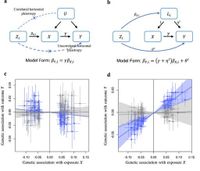A new method called Pleiotropic Clustering of Mendelian Randomization (PCMR) was developed to tackle the complex challenges of genetic studies, particularly addressing the issue of false-positive causal findings that can arise from related genetic variants. This innovative approach is set to improve our understanding of causal relationships between various traits and diseases, significantly enhancing the reliability of genetic research.
Mendelian randomization (MR) is a powerful tool in genetics that harnesses genetic variants to probe the causal relationships between exposures and health outcomes. By comparing genetic information derived from large-scale genome-wide association studies (GWAS), researchers can establish insights into potential causal pathways. However, the utility of MR can be hindered by a phenomenon known as horizontal pleiotropy, where a single genetic variant influences multiple traits through different pathways. This can lead to misleading conclusions regarding causal links.
The PCMR framework, introduced in the recent study, is designed specifically to detect correlated horizontal pleiotropy—an intricate form that occurs when genetic variants affect multiple traits simultaneously due to shared biological factors. The authors of the article noted, "PCMR can effectively detect correlated horizontal pleiotropy and avoid false positives in the presence of correlated horizontal pleiotropic variants, even when they constitute a high proportion of the variants connecting both traits (e.g., 30–40%)." This ability to discern genuine causal relationships from spurious associations brings a new level of rigor to MR analysis.
The development of PCMR stems from the need to enhance the validity of causal inferences in the field of genetics, particularly when dealing with complex traits and diseases where multiple factors interplay. Traditional MR methods often assume a linear relationship between genetic variants and outcomes, neglecting the possible confounding effects introduced by correlated variants.
PCMR operates by classifying genetic variants according to their pleiotropic effects, employing sophisticated statistical models rooted in a clustering framework. By integrating biological information into its causal assessments, PCMR overcomes one of the critical limitations of previous methods which often produced biased results due to unaccounted pleiotropic influences.
In a comprehensive evaluation of this novel methodology, the researchers tested PCMR across 48 pairs of common diseases, discovering that about 15% of these pairs exhibited correlated horizontal pleiotropy. This is a significant improvement over the performance of existing methods, which fail to accurately distinguish between genuine causal paths and those contaminated by confounding factors.
Furthermore, PCMR’s implementation provided insights into the genetic underpinnings of various psychiatric disorders, in which traditional causal relationships remain controversial. The findings underscore the complexities associated with interpreting genetic influences on health outcomes. As highlighted in the authors' statement, "The intricate interplay of genetic factors in complex traits underscores the ongoing challenges in accurately disentangling causal relationships amidst correlated horizontal pleiotropy." This emphasizes the necessity for robust analytical frameworks in genetics.
In addition to offering a thorough understanding of the data, PCMR enables researchers to refine their methods by excluding certain correlations that artificially inflate causal relationships—specifically variations that lack substantial biological grounding. This critical filtering process enhances the capacity to identify true causal effects, facilitating better-informed conclusions regarding the relationships between genetic factors and epidemiological outcomes.
The implications of adopting PCMR in genetic research are far-reaching. By improving the accuracy of causal inference in studies investigating the links between lifestyle factors, genetic predispositions, and diseases, we can better understand the etiology of various conditions ranging from metabolic syndromes to psychiatric illnesses. The introduction of PCMR not only represents a significant methodological advancement but also sets a precedent for future research aimed at unraveling the complex interactions within our genetic landscape.
Ultimately, as researchers continue to refine these analytical tools, the hope is that PCMR will become a standard part of the genetic research methodology repertoire, allowing for clearer insights into the driving forces behind disease and the potential for more effective interventions or preventive measures. The ongoing evolution of these methods highlights the critical role of innovative strategies in advancing our understanding of human genetics and health.




